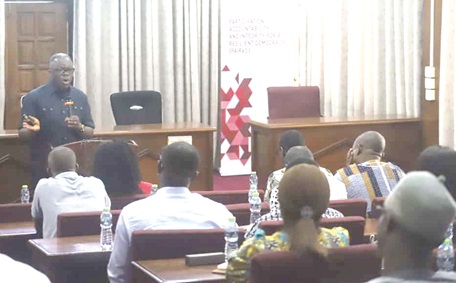Participants at a day’s stakeholder engagement have called for the institution of a robust whistleblower protection system to help in the fight against corruption in the country.
They said considering the risk involved in reporting individuals suspected to be involved in corruption-related acts, there must be a proper system in place to protect the identity and lives of whistleblowers.
“As a country, we must come up with a system that will enable people with information on corrupt practices to divulge such information without putting their lives and that of their families in danger” they stated.
They made the remarks during a regional stakeholder engagement on the formulation of the National Ethics and Anti-Corruption Action Plan (NAECAP) in Kumasi.
The National Anti-Corruption Action Plan (NACAP 2025-2024) concluded its implementation cycle last year.
In line with the Government of Ghana’s continued commitment to promoting integrity and combating corruption, a new framework, NEACAP 2026-2030, is being developed.
The engagement was under the Participation, Accountability and Integrity for a Resilient Democracy (PAIReD) programme commissioned by the German Federal Ministry for Economic Cooperation and Development (BMZ), co-financed by the European Union and the Swiss State Secretariat for Economic Affairs (SECO), and implemented by German Development Cooperation (GIZ) in partnership with Ghana’s Ministry of Finance.
Victimisation
The Ashanti Regional Head of Programmes, National Commission for Civic Education (NCCE), Paul Baah, said nobody would voluntarily come out with information on corruption knowing very well that he or she would face victimisation.
He cited an instance of a person who refused to sign a document in one of the public institutions in Accra after suspecting something fishy, but because of his refusal, he was transferred far away outside the national capital.
“If people will be comfortable to come out with credible information to fight the corruption menace, there is the urgent need for a robust system that will safeguard their lives,” he emphasised.
A staff of the Akenten Appiah Menka University of Skills Training and Entrepreneurial Development (AAMUSTED), Gertrude Acheampng, in a contribution, called for the referral of suspected corruption cases to the state institution mandated to investigate such crimes.
She indicated that such a move would ensure proper investigation of such matters instead of cases being handled within the institutions that issues occurred, stressing “an external institution dealing with such corrupt issues will help in the fight against corruption”.
Laws
A Consultant to the NAECAP, Edem Senanu, underscored the need for laws to be passed to make it more difficult for politically exposed persons to take advantage of the system for their parochial interests.
He expressed worry that Ghanaians were afraid to report corruption cases, an indication that the whistleblower mechanisms were not strong to provide the needed protection.
Making reference to Article 41(f) of the 1992 Constitution which enjoins Ghanaians to defend state assets and prevent the misuse and abuse of state resources, he urged the citizenry to be responsible and support the fight against corruption towards national development.
A private legal practitioner and a member of the NAECAP team, Sampson Lardy Ayenini, said “we are in a difficult situation due to corruption but we must come together as Ghanaians and do something about it.
He stated that it would take a few Ghanaians to get things done so that the country would not be plunged into trouble due to deep-rooted corruption, and stressed “if we do not wake up against corruption, what we all labour to get will be dissipated by a few individuals”.
In a welcome address, the Ashanti Regional Minister, Dr Frank Amoakohene, said the country annually lost about $3b to corruption-related activities, and called on Ghanaians to collectively stand against corruption for the benefit of all.
Writer’s email; gilbert.agbey@graphic.com.gh

